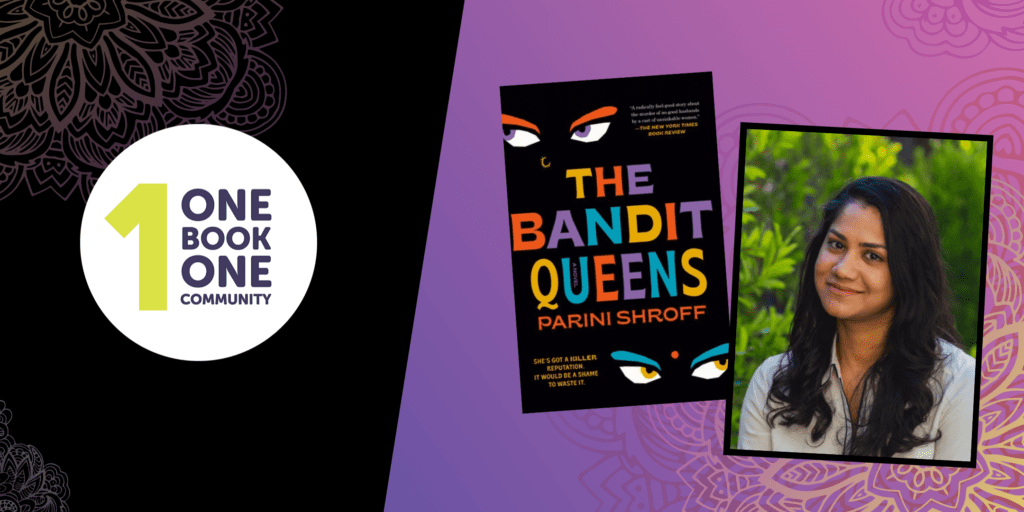
Now in its ninth year, the beloved One Book, One Community (OBOC) series is an opportunity for readers from Cook Memorial, Indian Trails, and Vernon Area public libraries to join in a shared experience of literature. This year’s selection is The Bandit Queens by Parini Shroff.
A young woman in rural India finds the false rumors that she killed her husband surprisingly useful—that is, until other women in the village start asking her to help them become “self-made widows,” too. For fans of Interpreter of Maladies by Jhumpa Lahiri or the TV series “Dead to Me,” The Bandit Queens is a razor-sharp tale of female friendship filled with clever criminals, second chances, and wry and witty women.
We had a chance to ask Parini a few questions:
One of your MFA mentors, Elizabeth McCracken, called your book “a hilarious romp about serious things,” which is such a perfect way of putting it. Can you talk a bit about that?
Looking back, two things were happening in tandem: first, I was realizing proselytizing in my fiction was not working, and secondly, there was a pandemic raging outside my door and I was desperate for some levity. So much of the writing process is accepting what is not working so that you may find what might.
While drafting this novel in 2020, I found humor, albeit dark humor, creeping into the pages. I’ve always loved reading and watching dark comedy and with this novel, I think all those influences crept in when I needed it the most for my own sanity. However, I initially rejected this approach as irreverent. I sought to respectfully and accurately address the scourges of domestic abuse, gender/religious/caste ostracization and patriarchy. But the humor was insistent, and I eventually realized it could serve as a bolster, preventing the book from collapsing under its own weight. Rather than minimizing these timely issues, the humor was highlighting them. Satire is effective, I think, because it teaches while allowing an audience some comedic relief; and if you can educate and entertain, that goes a long way toward eradicating ignorance.
How do you approach the concept of widowhood in the novel?
Widowhood in many countries including parts of India historically equates to doors closing on much of life: attire and ability and a whole myriad of opportunities in between. The idea that for these women widowhood, with all the restrictions it imposes, would be deemed preferable to life with a husband intrigued me. The novel is a twist on what we typically associate with widows—rather than grief there is freedom, rather than destitution there is self-reliance, and rather than isolation there is friendship.
There are a variety of ways invisibility plays a part in your book … about who in society people don’t pay attention to, so we’ll ask this: Which character do you feel that readers overlook or underestimate?
Khushi. It is my impression that for all the novel discusses caste and people have appreciated this exposure to the system, I’m rarely called upon to discuss Khushi’s nuances as a character. The woman’s a total badass. Given the myopic belief that handling corpses is “polluting” and therefore work for Dalits, Khushi twists stigma and prejudice to her economic advantage, charging upper castes whatever she wishes. Much like Phoolan Devi, Khushi has the twice trodden disadvantage of not only being Dalit, but a Dalit woman. Corpse burning is seen as men’s work, while women are often confined in purdah; therefore, that widowed Khushi assumes her husband’s business to support her two sons despite her in-laws’ objections is radical. And because she’s out caste, unlike the other women in the novel, she finds her success without any help from the micro-loans. Phoolan Devi is of course a real historical figure, but I believe it’s less known that Khushi’s character is also based upon the very real and very fierce–though less famous–Yamuna Devi.
What’s next for you? Is there another book on the way? A movie version of The Bandit Queens?
It would be lovely to see these characters come to life, but I’m very aware of how difficult and rare it is for an adaptation to come to fruition, as well as just how many wonderful stories are out there. That said, my fingers are crossed. To paraphrase the author Taylor Jenkins Reid: If my novel is my baby, the screen adaptation is my grandbaby. And I’d be honored to be a grandmother.
In the interim, I’m working on two novel manuscripts at the moment—I’ve never juggled like this before, but both stories have siren-called me and I’m happy to follow where they lead.
One Book, One Community Kickoff Events
Stop by a library kick-off event in celebration of this year’s OBOC series and pick up a complimentary copy of The Bandit Queens while supplies last. One copy per household. Additional copies will be available for checkout. Then, join us in January and February for more events related to the book, including a chance to meet the author! Book giveaway sponsored by the Friends of Cook Memorial Public Library District.
Sunday, December 8
- Cook Park Library: 12–2 pm
- Aspen Drive Library: 12–2 pm
- Indian Trails Public Library: 12–2 pm
- Vernon Area Public Library: 1–2 pm
1book.org
Discover more from Cook Memorial Public Library District
Subscribe to get the latest posts sent to your email.
Categories: Books and More, Events
Tags: Books and More, Events
